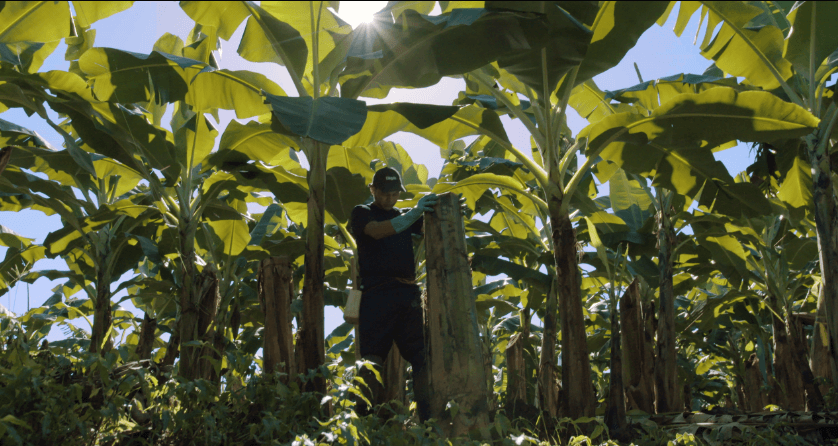Sustainability
January 28th 2021 ・ 4 min reading
At Chiquita, we’re bananas about bananas – we love our delicious, sunny fruit! And our care reaches right back to our farms, the people who work on them, their children and the communities they live in, as part of our overall aim to be as sustainable as possible. Below, we’ll look at how we’re putting this ambition into action.
Businesses need to make big changes in how they interact with the environment, and as farmers we have a special responsibility. We’ve taken a leadership role here, working with our key stakeholders on projects and actions. There are three pillars to our work:

It’s an amazing fact: bananas are the fourth most important food crop in the world after rice, maize and wheat. They are an essential food for millions of people around the world. Because we understand how much they mean to the world, we committed to ensure that by 2020 no fruit was thrown away.
Because of our high export standards, naturally some fruit just don’t make the cut – but this doesn’t mean they are no good. Some bananas have minor blemishes, but are perfectly good to eat, and these are turned into purée. We have our own purée plant in Costa Rica, where an average of 65,000 tons of bananas from Panama and Costa Rica are processed into delicious purée or banana flour. If bananas are bruised and cannot be processed, we give them to farmers to feed their animals.
Even the inedible parts of the plant – the stems, trucks and leaves – are put to good use as a mulch, protecting the soil from erosion and keeping in valuable moisture. As well as preventing weeds from growing, this eco-mulch also acts as the perfect, natural fertilizer. The composting trenches on our farms are also favorite feeding places for all sorts of birds, deer, insects, and frogs.
Our green biodigester in Costa Rica lets us capture energy from discarded fruit material. Wastewater that previously went to treatment lagoons now passes through a series of strainers and filters to remove solids, which local farmers use as a fertilizer. In the biodigester, friendly bacteria turn the filtered wastewater into biogas, which is stored in large rubber bags.
The whole system not only cuts down odors significantly, it also means that the wastewater going into the environment meets national effluent standards and, as it is rich in nutrients, the residue can be used to fertilize our crops.
We also work outside our farms in the areas where we work, and the Nogal reserve is one of the best examples. We’re still investing thought, finance and work into protecting this important wildlife reserve in Costa Rica.
In 2017, we made impressive progress in the reserve, which lies in the Sarapiqui area of Costa Rica. The Nogal initiative was established in 2004 as a joint effort between Chiquita and several of our clients to preserve and protect biodiversity, upheld by the Rainforest Alliance and the German Society for International Cooperation, GIZ. So far, we have planted over 900 trees and other retailers and cultivators have visited the reserve to see how, over its 13 years, we have added to the quality of life of the people living in the area.
Just in 2017, we recorded three new species in the reserve – a tapir, Costa Rica’s biggest land mammal, a bell bird and a yellow spotted lizard. These sightings prove that the connections made by this ambitious project, which aims to connect with other forests and their wildlife, are working well. We’ve applied for the reserve to be recognized as a private wildlife refuge, which will provide more protection against logging.
Bananas need water to grow – 2lbs of bananas need between 400 and 600 liters of water to grow and process the fruit, including cleaning and ‘dehanding’, which is the process of separating the large banana bunches into smaller ‘hands’ of five to six fruit.
Most of the water for growing our bananas comes from rainfall, but in areas that have a dry season, we have to rely on irrigation. Here, we’ve moved from wasteful overhead irrigation to water-efficient mini and micro-irrigation systems that cut our water use by around 80% – an annual saving of 1.7 billion liters. We’ve also installed ‘dry dehanding’ systems at 23% of our farms, which are saving a further 160 million liters of water every year.
We’re also very careful with wastewater from our operations, filtering out solids and protecting rivers and streams from pollution. Independent laboratories regularly check the quality of the water in our rivers and streams to ensure systems are working properly.
We’re really proud of our efforts to maintain biodiversity and ensure our bananas are produced as sustainably as possible. We’re committed to continuing our efforts so you know that when you pick up a bunch of delicious Chiquita bananas in your local store, they represent not just taste and quality but also a huge amount of work on sustainability.